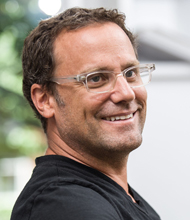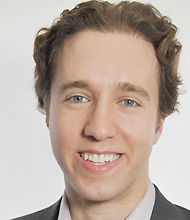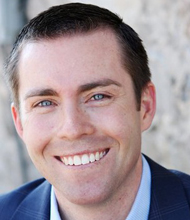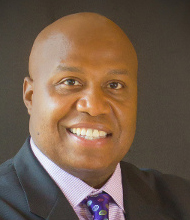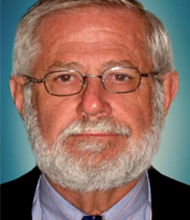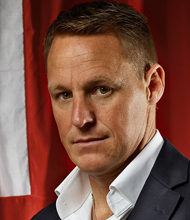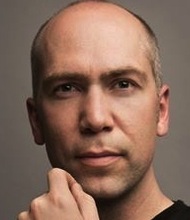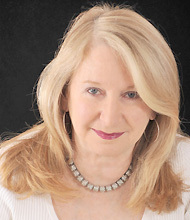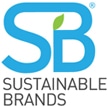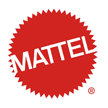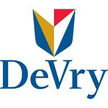| TRAVELS FROM |
|
SPEAKING FEE RANGE ** Please note that while this speaker’s specific speaking fee falls within the range posted above (for Continental U.S. based events), fees are subject to change. For current fee information or international event fees (which are generally 50-75% more than U.S based event fees), please contact us. $10,000 to $15,000 |
|
BOOK MITCHELL DITKOFF speakers@coreagency.com |
| TRAVELS FROM |
|
SPEAKING FEE RANGE* $10,000 to $15,000 |
|
Book Mitchell Ditkoff speakers@coreagency.com |
- Founder of Idea Champions, specializing in equipping future-oriented organizations to move beyond current practices and develop vigorous, sustainable cultures of innovation.
- “Innovation provocateur” with extensive experience in both corporate and educational environments.
- Champion of the power of storytelling to develop cultures of innovation.
Mitch Ditkoff believes a company’s most important assets are its employees. The commitment, creativity, and brainpower of its work force are the most valuable component of any company. Maximizing these assets for everyone’s benefit means providing settings, systems, tools, and techniques that develop employees’ capacity to think innovatively and act creatively.
In service of this belief, Ditkoff developed Idea Champions, a leading management consulting and training company that specializes in equipping future-oriented organizations to move beyond current practices and develop vigorous, sustainable cultures of innovation. As co-founder and president of Idea Champions, Ditkoff has worked with a multitude of mid-sized and Fortune 500 companies, providing the tools they need to thrive in today’s dynamic marketplace. Ditkoff’s clients include GE, Merck, AT&T, NBC Universal, Goodyear, General Mills, and MTV Networks, among many others.
Educated at Lafayette College and Brown University, Ditkoff enjoys sharing his knowledge in both academic and professional settings. He’s taught in several of the nation’s leading leadership development programs, including GE’s Crotonville Management Development Center, Duke Corporate Education, the Fuqua School of Business, Chubb Business School, the University of New Mexico’s Anderson School of Management, and Bell Atlantic’s Marketing Institute.
Association Meetings magazine recognized Ditkoff’s tremendous skill as a keynote speaker and large-group workshop facilitator by proclaiming him one of the “40 Hottest Business Speakers on the Association Circuit." For four years running, he has been voted the top innovation blogger in the world for his widely read “The Heart of Innovation” blog, an honor he’s parlayed into a role as a regular contributor to the Huffington Post. In 2016, Ditkoff published Storytelling at Work: How Moments of Truth Reveal the Real Business of Life.
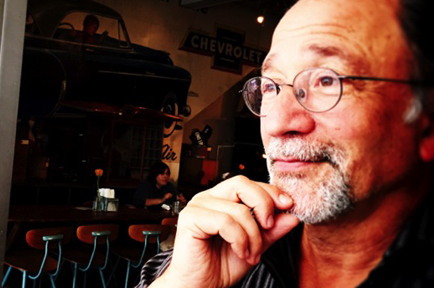 I want my audiences to go beyond complaint and blame and begin taking ownership for what is possible. I want my audiences to go beyond complaint and blame and begin taking ownership for what is possible. | |
| |
 | What do you want people to learn / take away from your presentations? |
 | I want people to realize that they (and the organizations they work for) have great untapped potential. I want my audiences to go beyond complaint and blame and begin taking ownership for what is possible. I want them to get some insights, ideas, and a-has they are willing to act on. I want them to feel inspired, empowered, and committed to being a force for positive change. And I want them to enjoy their experience at my keynote. |
 | What kind of special prep work do you do prior to an event? How do you prepare for your speaking engagements? |
 | I do lots of prep. All of my keynotes and workshops are customized, though I do have a big portfolio of material to draw from. My prep begins with a simple needs assessment. I begin with a phone conversation with the client, doing my best to learn about his/her corporate culture, industry challenges, and hoped for outcomes from my involvement with their company. In other words, I get clear with my clients about what would qualify as a success.
I also ask to interview a cross section of other key stakeholders so I get some diverse inputs. Then, whenever possible, I send the client an online poll to send to participants. This gives everyone a chance to weigh in the issues. It primes the pump for the session and provides me with significant insights around which I shape my keynote or workshop. |
| My “court jester” moment got me closer to the King. | |
| |
 | Have you had any particularly memorable speaking engagements / unusual situations arise while on the road? |
 | Many. Two of these are chapters in my new book. The funniest one happened at GE. I was leading a full day class called “Innovation and Business Growth”. At one point in the session I had to go to the bathroom, so I gave participants an exercise and made my way out of the room, but I forgot to turn off my lavalier mike. My entire bathroom experience was broadcasted to 75 of GE’s “best and brightest.” It actually had a great outcome. After the laughter died down, I found that this group of people were far more engaged, relaxed, and connected to me than previous groups. Somehow, my little amplified bathroom episode, made me more human in their eyes. My “court jester” moment got me closer to the King.
The other memorable experience was at Wells Fargo where I was supposed to speak to 200 managers in the morning after a cross-country flight. I never got a wake up call and my cell phone was set to vibrate, not ring. Bottom line, I woke up 5 minutes before my keynote and couldn’t go through my morning prep rituals, as I usually do. Although I assumed my talk was going to be a disaster because I didn’t run through my standard “pre-keynote” operating procedure, my presentation turned out to be a big hit. I realized that a lot of my prep ritual was just nervous energy and that if I really trusted what I knew, everything would be just fine – which it was. |
 | What types of audiences would most benefit from your message? |
 | Audiences who:
• Are open-minded and curious. • No matter their industry or job title, are open to the input of others and are willing to listen and reflect. • Realize that “business as usual” is a losing game and they need to start considering new ways of thinking, being, and doing. |
 | Which of your keynote speaking topics are your favorites and why? |
 | My newest topic, Storytelling at Work, is my most current favorite because it coincides with the release of my book, which builds a very sound case for what I am speaking about. Also, because I am fascinated to see how my keynote presentations, workshops, and wisdom circles morph in response to audience response.
My other two favorite topics are “Catalyzing the Creative Mind” (what people can do, on the job, to bring out brilliance in others) and “Fostering a Culture of Innovation” (which demystifies this big, hairy topic and results in people generating, real-time, their own game plan for establishing a culture of innovation within their sphere of influence). |
| Stories...are the most direct and effective way to connect with people, go beyond the “guardians at the gate,” and deliver a meaningful, memorable message that can be applied in people’s lives. | |
| |
 | What inspired you to start doing speaking engagements? |
 | My own fascination for opening minds and helping people accomplish their very ambitious goals. I am also inspired to engage large groups of people for a relatively short amount of time and see how far I can take them along the road of their own discovery. In other words, speaking engagements are a great way to get the attention of people and help them make rapid progress on a meaningful goal or challenge. |
 | How much do case studies, personal stories and/or humor factor into your keynote speech content? |
 | Personal stories and humor are a big part of all my presentations. Stories, as my book bears out, are the most direct and effective way to connect with people, go beyond the “guardians at the gate,” and deliver a meaningful, memorable message that can be applied in people’s lives. Humor is also a vital element of my approach. It helps reduce resistance, increase engagement, focus attention, and radically increase receptivity. “A-ha” and “Ha-Ha” are very connected. I’m not all that into case studies, though I do include some best practices and anecdotes that help illustrate the points I am making. |
| Einstein once said, “Not everything that counts can be counted, and not everything that can be counted, counts.” | |
| |
 | What are some of the successes you've helped clients make? |
 | One of our clients, AtlantiCare, a large health care conglomerate in Southern New Jersey, approached us some years ago because they wanted to win the Baldridge Award, a hard-to-achieve acknowledgment of the best-run companies in the United States. When they looked at the application, they noted there were 26 questions about innovation – for which they had no answers. So they engaged our services to help them become a more innovative enterprise. Eighteen months later they won the Baldridge Award.
We’ve had many other successes, as well. After AT&T deregulated and were no longer a monopoly, they brought us in to help their workforce become more creative. We taught AT&Ts trainers how to teach our “Get Out of the Box” training and then, when Lucent split off, we taught Lucent’s trainers. Goodyear initiated 250 of what they called “Big Idea Projects” in response to our various interventions. General Mills developed and manufactured a $250 million dollar snack food in response to our work with their product development team. A&E Television originated the idea to syndicate The Sopranos in one of our brainstorm sessions. Home insurance saved $80 million dollars from a single idea generated in one of our sessions. Of course, there are many other individual and team successes that have manifested that we do not track, but have heard, anecdotally, that we have made a big difference. However you must be mindful of the fact that not everything we do has an ROI attached. As Einstein once said, “Not everything that counts can be counted, and not everything that can be counted, counts.” |
"Mitch Ditkoff′s keynote presentation was both entertaining and informative. Over 1,030 Merck employees attended and rated the session a 4.8 out of 5.0. In just two hours, Mitch not only got participants out of the box, he also helped us understand what it takes to establish a sustainable culture of innovation.”
– Jim Aubele, Associate Director of Organizational Learning, Merck
"Mitch Ditkoff's innovation keynote at our 2014 Developer's Conference was an energetic and engaging opening to our event. Thanks to the pre-work Mitch did with us, his themes were perfectly synchronized with the objectives of the conference — increase innovative problem-solving and increase global knowledge sharing. Mitch's comments got our people thinking and prepared to tackle the interactive objectives of the meeting. After Mitch, it was 'Game on!'"
– Andy Billings, VP, Profitable Creativity, Electronic Arts
– Rich Nugent, CEO, Nations Roof
"Mitch Ditkoff’s culture of innovation keynote at our annual conference was informative, inspiring, and entertaining. I know that keeping 128 executives, managers, engineers and manufacturing people engaged for five hours is a challenging task, but you pulled it off extremely well."
– Gordon Thomas, VP, Hydrosystems
"Idea Champions made our annual conference on innovation a huge success. They not only expertly facilitated the process, but ensured that our company developed a culture that will foster innovation from here on in."
– Rick Yockelson, SVP of People and Administration, Hudson Group
"Mitch Ditkoff’s highly engaging approach, combining creative energy and business practicality, is a real winner. His process and practical tools helps people experience innovation in the moment, and more importantly, enables them to apply the learning back home with their own teams."
– Mike Canning, Managing Director, Duke Corporate Education
"Your presentation was received with the highest of ratings. I especially appreciate how your services, methods and products clearly reflect your understanding of adult learning and practice."
– Carole Weinstein, Associate Director, PricewaterhouseCoopers
"Several of the ideas we came up with in your session are being developed into concrete projects that are looking like very profitable opportunities."
– Rudy Villa, VP, GE/RCA Licensing
"Great job! Well-planned. High energy. Outstanding value."
– Samuel Bruce, Assistant Dean, Fuqua School of Business
"Idea Champions brings an infectious enthusiasm that will win over even the most cynical person in your organization!"
– Kevin Reilly, President, NBC Universal
"You are sowers of a wonderfully powerful seed that now has begun to germinate and revitalize our organization."
– Candace Thompson, VP, First National Bank of Chicago (now Bank One)
"Mitch Ditkoff helped us generate powerful new ideas and engage with such energy that, six months later, his impact still hasn’t worn off! As a direct outcome of his session, students and faculty are actively working on several new projects that will make our College even more entrepreneurial! Thank you!""
– Candida G. Brush, Chair: Entrepreneurship Division, Babson College
"Through your brainstorm facilitation, we gained more than 100 original ideas of high quality. The best of these will guide AT&T's development for years to come."
– Robert Rubin, CCS Product Development, AT&T
"Superb! Everyone was impressed with your ability to spark and harness the collective ingenuity of our group."
– Craig Harden, Global Risk Manager, Scotia Capital
"What a wonderful Innovation event Idea Champions put together for us! Talk about out of the box thinking, it was out of this world!
– Eric Birnbaum, Sr. Packaging Engineer, Kraft Foods
"Mitch Ditkoff has been a partner with the Chubb Business School for four years and has helped us drive the skillset and mindset of innovation throughout the organization. This partnership has resulted in an approach that focuses not only on the skill of creative thinking, but on the application of that learning. Several ideas from Chubb Business School have been pitched to our Venture Fund Team and received funding for development and implementation. Definitely solid ROI!"
– Mary Ann Heenehan, Corporate Groups Development Manager, Chubb Insurance
"Idea Champions is creative in their approach, experienced, willing to share their expertise readily, easy to work with, and delivers exactly what they promise."
– Peter Clist, Head of Management Institute, Allianz (Munich, Germany)
"No organization, especially those in Health Care, can expect to thrive without drawing on the collective talent and ideas of their workforce. Idea Champions helped us discover and apply those talents and ideas in a highly productive and practical system."
– Don Parker, President, AtlantiCare Health Care Systems
"You helped transform our meeting into a truly dynamic and worthwhile experience."
– Abbe Raven, CEO, A&E Television Networks
"Mitch Ditkoff is creative in his approach, experienced, willing to share his expertise readily, easy to work with, and delivers exactly what he promises."
– Peter Clist, Head of Management Institute, Allianz
"Superb! Everyone was impressed with your ability to spark and harness the collective ingenuity of our group."
– Craig Harden, Global Risk Manager, Scotia Capital
Mitch Ditkoff enjoys referring to himself as an “innovation provocateur,” someone who seeks to spark the innovation mindset so essential to professional success. He brings his down-to-earth style to share a very down-to-earth conclusion: the best way to spark innovation is to encourage the art of storytelling. Stories engage, energize, and inspire, awakening our tacit knowledge and giving us the tools to share our insight and wisdom with others.
If a company wants innovation, Ditkoff suggests, it needs to give people something to be engaged and innovative about. Innovation isn’t a science; it can’t be engineered. Innovation habits can, however, be encouraged, and storytelling is the simplest way to invite more people into this innovation mindset.
Mitch's New Keynote, In His Words...
Since 1987, I have been working as an innovation provocateur for a wide variety of forward thinking organizations.
Bottom line, I help people wake up, get out of the box, and originate bold, new ideas to meet their ambitious business goals. Along the way, I've discovered quite a few methods to spark the innovation mindset -- even in the most conventional of thinkers.
But of all the methods I've discovered, much to my surprise, there is one that has proven itself to be the most powerful -- and that is storytelling. Yes, storytelling, the humane communication of memorable narratives that engage, energize, and inspire positive behavior change.
All my clients, no matter what their industry, want the same thing. They want their people to be "on top of their game" -- to be as creative, collaborative, and committed as possible.
Towards that end, they spend millions of dollars each year training their employees. And while these educational efforts do have some value, they often ignore a fundamental reality: that within each and every person they are trying so hard to "tool up" is an untapped, naturally occurring, business growth intelligence that does not need to be taught, only awakened.
Often referred to as tacit knowledge, this little understood resource is omnipresent in your organization, but hiding in the unexpressed stories of the people who actually do the work.
What if your organization could find a simple way to activate this hidden resource?
What if your people had a dependable way to share what they really know with each other? Not just data and information, but insight and wisdom. Not just their best practices, but the best of their best practices. What really matters -- the hard to measure mojo of what really makes a difference on the job: Focus. Trust. Courage. Creativity. Purpose. Resilience. Adaptability. Intrinsic motivation. Perseverance. Collaboration. Integrity. Passion. And commitment.
The secret sauce. The missing piece. What gets people out of bed in the morning. If that's not in place, all the hot talk about innovation is nothing more than wasted breath.
This is precisely what my keynote is all about -- a simple way, via the transformative power of storytelling, to increase employee engagement, spark a culture of innovation, and quicken the communication of your company's collective brilliance.
Creating the Innovation Mindset
The Power of Personal Storytelling
to Spark Business Breakthroughs
For the moment, let's assume your organization values innovation and wants to get everyone into the act. That's the good news. The not-so-good news is that the effort to accomplish this noble goal is a challenging one. When you think about how difficult it is for just one person to lose five pounds or quit smoking, imagine how hard it is to get hundreds – or even thousands – of people to go beyond their collective limiting assumptions and enter into an open mindset where anything is possible.
The question, of course, isn't whether you should take on this challenge — the success of your business depends on it. The question is: How you will take on the challenge and, even more importantly, how will you begin?
Our suggestion? Begin at the beginning. And the beginning is mainly about story — the old, innovation-averse stories that the people in your company keep telling AND the new, future-building stories your people haven't yet imagined or told – the kind of stories that will have a massively positive impact on your company's culture, climate, and creativity.
Since 1987, Mitch Ditkoff has worked with hundreds of savvy organizations committed to fostering a culture of innovation. Along the way, we've tried many things to move our clients beyond their old mental models and attachment to the status quo. Most of what we've done has worked quite well, but one thing has worked best — and that is storytelling.
Storytelling, we've discovered, is the simplest way to move people into an innovation mindset and change an organization's culture. When you change the story, you change the mind, and when you change the mind, you change the future. Which is precisely what our workshop is all about.
Our premise is a simple one. If you want to establish an engaged, innovation-leaning workforce, give people something to be engaged and innovation-leaning about. And what that something is has less to do with what outside experts want to teach than what your workforce already knows — their own, innate, untapped business-growth brilliance that is hiding in the last place they usually look — their own stories.
Creating the Innovation Mindset gets those stories on the table in a highly engaging way — stories that become fuel for a fire that sparks insight, collaboration, wisdom, and the peer-to-peer sharing of "tacit knowledge" — the hard-to-communicate essence of what really matters on the job.
Click here for more information about how this workshop is is put together.
Storytelling At Work
Most forward thinking organizations, these days, have launched (or are launching) some kind of “change initiative” designed to raise the bar for innovation. The language they use to describe their ambitious goals may vary, but it usually has something to do with “gaining a competitive edge” or “differentiating ourselves from the competition” or “establishing a culture of innovation.” A noble effort, indeed.
While each of these organizations have their own, unique game plan for how to become more innovative, they all – no matter how different their businesses are from each other – have one thing in common. Their efforts, more often than not, disappoint. In fact, 90% percent of all corporate change initiatives fail. It is not for a lack of trying. It’s because the effort, no matter how well-funded, rarely addresses the heart of the matter – and that is the human side of the equation.
Processes are created, protocols are invented, and technology is enabled, but the people expected to embrace and drive innovation are not sufficiently on board. Why not? Because they end up perceiving their company’s new initiative as either the “flavor of the month”, a parallel universe, or somebody else’s job. They don’t own it.
Innovation cannot be engineered. Mindset cannot be legislated. And people cannot be treated as if their company’s newly launched change effort is a virus they need to protect themselves from. If an organization truly wants its workforce to become more entrepreneurial, agile, and creative, it needs to shift the way it frames their challenge -- from top down to bottom up, from outside in to inside out. Translation? It needs to find a way to activate the already existing innovation mindset of its workforce – the innate values, principles, and qualities of the “rank and file” that have become the unwilling stepchildren to business as usual.
Here’s the bottom line: You don’t have to tell people how to become more innovative. You don’t need to teach them. All you need to do is give them engaging opportunities to tune into what they already know about the matter and then share what they know with each other. The result? A proactive, self-organizing, intrinsically motivated community of practice dedicated to sharing what it really takes to innovate on the job.
Mitch Ditkoff’s groundbreaking keynote, Storytelling at Work, jump starts this effort. After 27 years of being an innovation provocateur to wide variety of Fortune 500 and mid sized organizations, Mitch has come to realize that the simplest, most powerful way to activate innovation in an organization is via the conscious sharing of stories – “moments of truth on the job” that have embedded within them everything a person needs to know in order to become an inspired catalyst for positive change.
Storytelling is the mother lode. Storytelling is the diamond cutter. Storytelling is the catalyst that provides people access to their own “innovation DNA” – curiosity, creativity, risk taking, courage, resilience, agility, commitment, integrity, focus, selflessness, adaptability, honesty, collaboration, passion, and perseverance. People don’t need to be taught these qualities. They already have them. All they need is for these qualities to be activated – and the simplest way to do that is via storytelling.
Mitch Ditkoff’s groundbreaking keynote, Storytelling at Work, makes a compelling case for why organizations need to foster a culture of storytelling, what it’s all about, and how they can do that in the most engaging, empowering, cost-effective way possible.
Storytelling at Work Workshop.
The Art of Storytelling (34 min. podcast)
Delivering Meaningful Messages via Storytelling (3:34 video)
Why Create a Culture of Storytelling? (Huff Post)
The Brilliant Complaint Department (book excerpt)
The Joy of Heckling (book excerpt)
Fostering a Culture of Innovation
When, Where, Who, Why and How
All business leaders want the same thing — and that is an organizational culture that is agile, adaptive, and conducive to sustainable innovation.
Easier said than done, however.
When you think of how difficult it is for just one person to lose five pounds or stop smoking, imagine how difficult it is to engage an entire workforce in the effort to innovate.
But just because it′s difficult, doesn′t mean it′s impossible. You′ve got to start somewhere. And Creating a Culture of Innovation is the best way to start — a highly engaging wake up call that demystifies innovation, sparks creative thinking, and provides an easy-to-adapt model that each participant can immediately apply on the job.
Face it. The days of depending on R&D to ensure your organization is innovating are over. The times have changed. Now, everyone needs to get into the act.
Includes:
- Best innovation practices of leading organizations
- A robust business case for why innovation matters
- Hundreds of actionable culture of innovation ideas, sorted into eight categories
- Three culture-building tools and techniques
- A free, one-month license of Free the Genie
Catalyzing the Creative Mind
There′s a lot of talk these days about the need to raise the bar for innovation and creativity. Understandably so. These are challenging times we find ourselves in. The game is changing, big time. Talk, however, is cheap. What your workforce needs is more than talk. What your workforce needs is a way to activate, accelerate, and apply their innate creativity on the job. So they can intelligently respond to changing times. So they can solve old problems in new ways. So they can generate new ideas — both incremental and breakthrough — that grow the business.
Your workforce doesn′t need to be taught how to be creative. (They already are.) What they need is a simple way to catalyze their creativity. Enter Catalyzing the Creative Mind — Mitch Ditkoff′s engaging interactive keynote that dramatically increases the odds of each member of workforce becoming proactive innovators on the job. Not next month. Not next week. Not tomorrow. Now.
Includes:
- Pre-session 20 Qualities of an Innovator poll
- Compelling business case for why creative thinking is important
- Creative thinking jump start in eight key domains:
- Balancing left brain analysis with right brain thinking
- How to recognize and go beyond limiting assumptions
- The art of framing powerful questions
- Seeing opportunities with fresh eyes
- Blue Sky Thinking (how to unleash the imagination)
- Synthesizing innovation: How to spark new product and service ideas
- How to nurture the "seed of innovation" moment
- Diffusing nay saying and idea killing behavior
- A sampling of best practices and inspiration from creative luminaries
- Free one month license of Free the Genie (online brainstorming tool)
Team Innovation
(Best as a 1.5 to 3 hour interactive workshop / keynote)
Let′s cut to the chase: Your team is under the gun and stressed to the max. You want it to accomplish great things, but finding the time to reflect, innovate. or even plan seems like a pipe dream. Your team has all the talent and expertise to work smarter, but lacks the connectedness, vision, tools, and alignment to make the necessary shift.
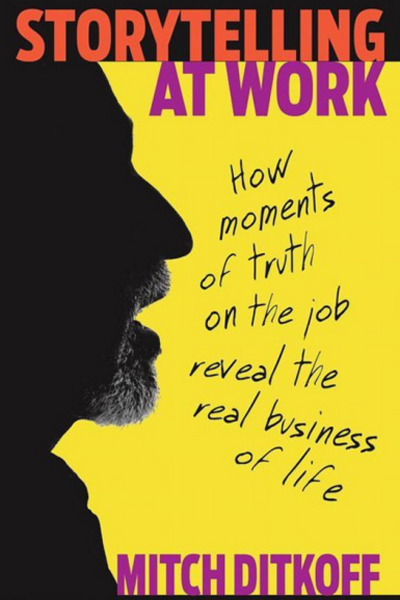
 Awake at the Wheel: Getting Your Great Ideas Rolling (in an Uphill World)
Awake at the Wheel: Getting Your Great Ideas Rolling (in an Uphill World)
Awake at the Wheel is a book about ideas: what they are, where they come from, and what it takes to manifest them in a world not always ready for the new and the different. Simply put, it′s a book about possibility, about the wellspring of creation, about the strange and fascinating process we all go through whenever we have an idea and try to do something about it. And while it′s often said that "ideas are a dime a dozen," the fact is that your idea - the one you can′t get out of your head - is priceless. That is, IF you make the kind of effort required to turn that top of the line idea into a bottom line reality. Maybe it′s an idea for a new business. Maybe it′s an idea for a new product...or invention...or a book you want to write...or a school you want to open...or a move you want to make. Maybe it′s an idea for something that will change the world...or if not THE world, then YOUR world. Whatever it is, one thing is clear: it′s time for you to take the next step. Now!
Order Here
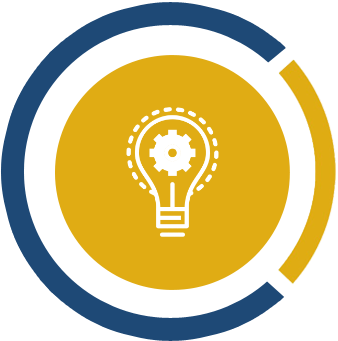
In this interview, Mitch Ditkoff discusses:

 VIDEO
VIDEO TESTIMONIALS
TESTIMONIALS PROGRAMS
PROGRAMS SPEAKING
SPEAKING BOOKS
BOOKS INTERVIEW
INTERVIEW




